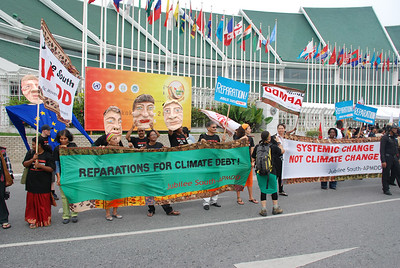Guest Blogger Divya Rao: Confronting Reality: A Lack of Accountability at COP25
The Support of Toyota and Other Manufacturers for the Trump Administration’s Policy Rollbacks Shows the Need to Confront Corporate Decisionmaking on Energy and Climate

As Cara Horowitz and Idalmis Vaquero discussed in their blog posts, the true highlight of COP 25 has been the numerous youth and indigenous interventions, actions, and disruptions. After spending four days at the COP, I came away from the events surprised by the level of corporate visibility and greenwashing in the side events, but also impressed by the activists asking corporate panelists sharp and insightful questions to try and hold them accountable.
At one point, I found myself at a side event on the challenges and opportunities in decarbonizing transportation with a mixed panel of state transportation regulators and the Energy and Climate Program Manager from Toyota. During the panel, Max Parness, the Toyota representative, gave remarks about Toyota’s historic leadership in the industry with the release of the Prius and their upcoming plans to provide electric or hydrogen versions of their entire portfolio of cars by 2022. He also approvingly spoke about CARB’s new Clean Miles Standard that is in development.
However, during the presentation, all I could think about was the current lawsuit over the repeal of California’s waiver for tailpipe emission standards under the Clean Air Act. At the end of October, Toyota, along with other automakers, decided to intervene in this lawsuit and join the Trump Administration, opposing California’s waiver authority. This is a big deal.
California’s waiver under the Clean Air Act allows the state to set more stringent tailpipe emissions standards than the federal government, effectively forcing automakers to make cleaner cars given the size of California’s economy and automobile market. Moreover, states can choose to align with California’s standards, as thirteen states have done, instead of the federal tail-pipe emission standards.
While the Trump Administration has not rolled back federal tailpipe emission standards yet, removing California’s authority to set its own standards is, in effect, the first step. So, to me, the Toyota manager’s remarks about their contributions and future plans to decarbonize transportation was somewhat incongruous with the reality that Toyota is legally positioning itself in opposition to aggressive decarbonization under California’s leadership—especially given that Toyota could have refused to join the lawsuit (like Honda did) and/or could have joined the voluntary agreement with California (as Volkswagen, BMW, Honda, and Ford have).
So, after the panel, I asked the Toyota manager about lawsuit and his perspective. While he first pivoted to Toyota’s progress on electric cars that he spoke about during the panel, I continued to press him on the issue. Ultimately, I learned that there were internal concerns about the potential of tariffs placed on Toyota by the Trump Administration. Since part of Toyota’s supply chain is imported and given the uncertainty of the outcome of the upcoming election, I learned that there were concerns about tariffs because it takes about ten years to shift Toyota’s supply chain. Furthermore, when I questioned whether the decision to join the lawsuit was Toyota’s or the trade group’s, I learned that Toyota and the other automakers fund and affirmatively determine the course of action for the trade group the Association of Global Automakers (instead of the trade group itself making the final decisions).
It was disappointing to hear that Toyota made the decision to join the Trump Administration in this lawsuit over the specter of tariffs. However, it was interesting and helpful to finally get some insight into Toyota’s decision-making.
Since COP 25 has ended, it has become clear to me that now, more than ever, we each need to question and confront the decisions and lack of action by those in positions of power to hold them accountable. As Greta Thunberg remarked during her speech at the Climate Emergency High Level Event on Wednesday, “…I still believe that the biggest danger is not inaction. The real danger is when politicians and CEOs are making it look like real action is happening when in fact almost nothing is being done apart from clever accounting and creative PR.”
Divya Rao is a J.D./M.B.A. joint degree candidate at UCLA School of Law and the UCLA Anderson School.







Reader Comments